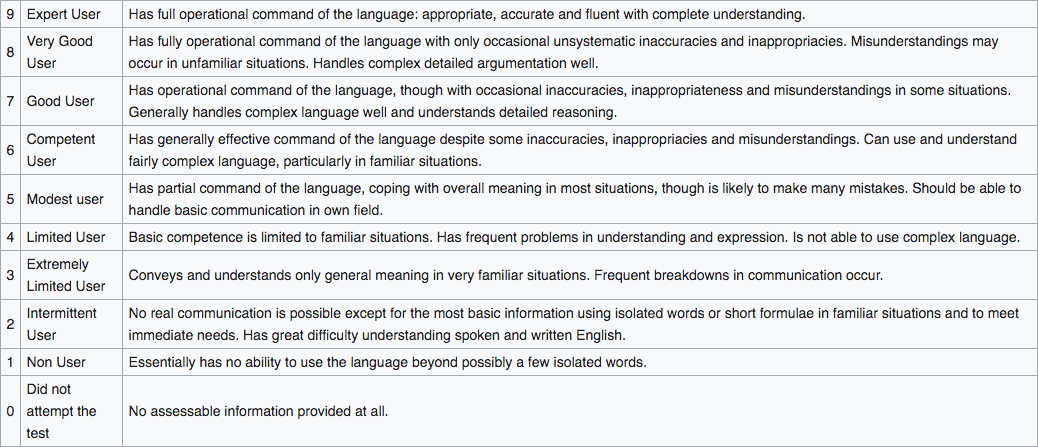IELTS stands for International English Language Testing System, a test carried out by British Council, IDP: Australia and Cambridge examinations for language assessment. This exam assesses your English language skills for further studies in English speaking countries. These test scores are accepted by a number of Universities when seeking admissions.
To know more about the band scores, let’s understand how the scoring is done.
The different sections of the paper that is Listening, Reading, Writing and Speaking, are evaluated separately. The score are between bands 0 to 9.
The important thing to consider here is that the evaluation by the institutes/immigration assessment authorities happens on the basis of both, your overall scores and your individual scores in all the sections, as many of them have certain rules regarding the minimum band scores that they can accept.
For reading and listening, the calculations are pretty much straight forward. There are 40 questions in each section and every question carries one mark each. These have direct answers and scores of these are based on the number of correct answers. For example- if your have 30 correct answers in listening, then your raw score will be 30 in IELTS listening test out of the total 40 for the listening section, which will then be converted into bands.

For writing and speaking,
the scores are assessed by the trained IELTS scorers who have their certain
parameters for the judgement. Hence the assessment is subjective and is given
after careful evaluation by the scorers. They directly calculate the band scores
based on their assessment criteria.
The parameters for judging writing tests are:
i) Completion of task: Answering the questions with clear distinctive
points and promptness.
ii) Coherence and Cohesion: The ability to answer the questions in a well-organized
manner using paragraphs and relevant ideas to explain.
iii) Lexical Resource: It assesses
the ability to use good vocabulary appropriately.
iv) Grammatical Range and Accuracy:
The ability to form sentences using correct form of grammar.
There are IELTS Preparation Guide available which
gives a detailed study material along with practice tests that helps you
prepare well for the test.
There is no parameters like passing or failing in this test. You are judged on
these 9 bands which display the candidates level of competence in English
Language. Even though the scoring seems like an easy task, what actually is the
tricky part is converting the scores to bands.
For converting raw scores to bands, the British council has laid out a band scale comprising of band scores in correspondence with the raw scores. This forms the basis of the band score evaluation.
The band descriptions are as follows:

The individual scores of all the four sections are added up and then divided by four, this gives the average of it. This average value is then rounded off to the next half band or whole band to calculate the band score.
For instance, if you got 6.5, 6, 6 and 7.5 scores in the four sections respectively, then the total comes out to be 26. Dividing it by four, you get 6.5. This then becomes your overall band score (6.5).
A higher overall score, improves your chances of getting admission into your choice of institution or country.
Once you know how the IELTS bands are calculated and what they mean, you need to judge your IELTS score as to how good,average or bad it is?
Now, How do you be the judge for it?
IELTS is accepted in countries like Australia, Britain, Canada, Ireland, New
Zealand, and over 3,000 academic institutions in the United States. Also,
various professional organisations across the world also accept these scores
when hiring professionals.
The minimum requirement of IELTS scores is different for different colleges and in different countries. And hence, there is no one way of saying which score is good and which score will guarantee you an admission. Depending on your country, college or even course preferences, the score requirements vary.
Let’s have a look at the minimum score requirements in different countries:
1. United Kingdom (UK)
For people seeking UK visa and Immigration, the score requirements depend on the type of visa you wish to apply for.
For Tier I or general visa, the candidate needs a minimum of 7.0 score in each of the four skills.
For Tier I Exceptional Visa/Tier I Entrepreneur Visa/Tier 2 General Visa/Tier 4 General Student Visa for below degree level and pre sessional courses, a minimum
4.0 overall score in all the four skills is valid.
For Tier 4 General Student Visa for degree level and above, a minimum of 5.5 overall score is required in each of the four skills.
According to the UK government, taking IELTS has been made mandatory.
2. Australia
When applying for a student visa to Australia, you need a minimum overall test score of 5.5.
For candidates applying for immigration purposes, the minimum IELTS score requirement is of 6.0 or more and can go up to a total score of 8.0 and above depending on the application type.
3. Canada
For application of a student visa for Canada, you would need you to score at least 5.5 in each of the four skills with an overall minimum score of 6.0 and above for undergraduate courses.
For graduate courses, the requirement goes up to 6.5 and above with a minimum score of 6.0 in each of the four skills of IELTS.
4. MS MBA Student Visa in USA
For applying to Universities in the US you need to score a minimum of 6.5 overall score in the IELTS exam.
Once the country is finalized you should thoroughly go through the requirements for the procedure you are applying for and try to fulfill them accordingly. Nowadays, you have access to IELTS Institute In Mumbai and elsewhere in order to assist you crack the test.
Author Bio: Rucha by profession is a content writer and graphic designer at Walnut Folks. She has been interested in guiding & counseling students who wish to study abroad for a long while now. She loves interacting with fellow professionals to explore studying abroad in different countries and is herself going abroad soon to pursue her dream of studying abroad. With a combination of design and writing skills, she aspires to explore domains of marketing and journalism. Travelling, good music and movies keep her going.

